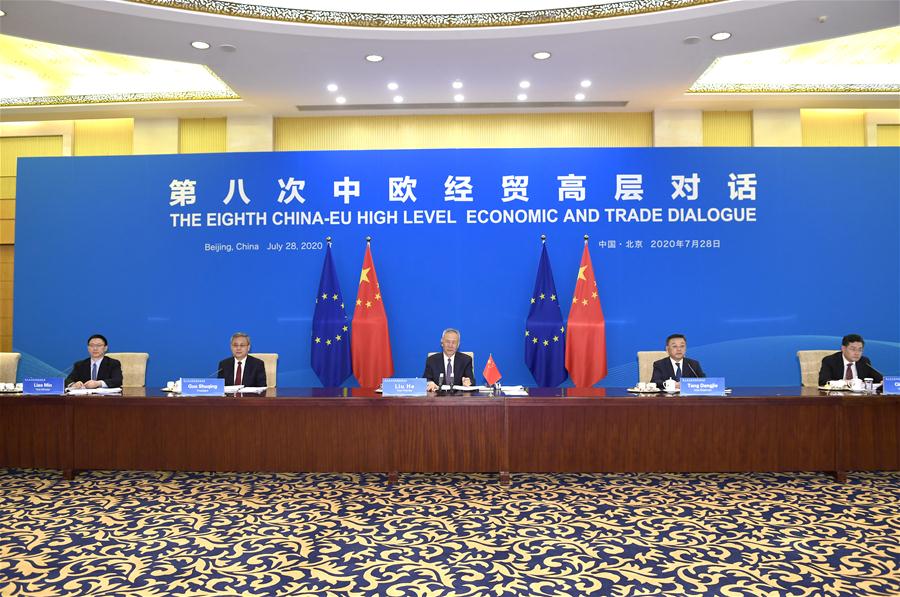Sino-EU cooperation set to improve amid contagion
China and the European Union will further enhance their economic and trade ties and cooperation in fighting the COVID-19 pandemic, senior officials said at a meeting on Tuesday.
China and the European Union will further enhance their economic and trade ties and cooperation in fighting the COVID-19 pandemic, senior officials said at a meeting on Tuesday.

Chinese Vice Premier Liu He, also a member of the Political Bureau of the Communist Party of China Central Committee, co-chairs the 8th China-EU High-level Economic and Trade Dialogue with Valdis Dombrovskis, executive vice president of the European Commission, via video link on July 28, 2020. [Photo/Xinhua]
Chinese Vice-Premier Liu He and European Commission Executive Vice-President Valdis Dombrovskis co-chaired the 8th China-EU High-Level Trade and Economic Dialogue via video link on Tuesday.
Liu said the COVID-19 pandemic is a common challenge facing humanity. As two major economies, China and the EU are promoting global unity in fighting the contagion and supporting economic recovery, and jointly safeguarding multilateralism and the free trade system. This is beneficial to China, Europe, and the world as a whole.
Dombrovskis, who was Latvia's prime minister from 2009 to 2014, said before the meeting that the coronavirus crisis has given the EU "no other option but to work hand in hand" with China.
"It's an important relationship but not an easy one," Politico, a news website, quoted him as saying.
The EU has long felt that it was caught between the growing tensions between China and the United States. EU foreign policy chief Josep Borrell, a former Spanish foreign minister, has indicated that while the pressure to choose is increasing, the EU will make decisions based on its own interests and values.
Dombrovskis said: "We have certain demands on our side, such as the need for our companies to get the same treatment in China as Chinese companies (get) here. By pulling together, we can recover more quickly economically, and make progress in areas of mutual interest such as trade and investment relations."
During the dialogue, the two sides had in-depth and efficient discussions. They reached common consensus in areas including their cooperation in COVID-19 pandemic response, global economic governance, the security of industrial and supply chains, negotiations on a bilateral Comprehensive Agreement on Investment, World Trade Organization reform, market access, digital economy, regional connectivity, finance and taxation, the Ministry of Commerce said late on Tuesday.
Both sides also discussed market access in the financial services sector, with the EU encouraging China to continue opening its financial services market to foreign investment, according to the EU's statement on the dialogue.
A range of regulatory issues in the financial services sector were also discussed, including cooperation on green finance, equivalence assessments, and the international role of the euro and the renminbi.
The European Commission, in its Summer Economic Forecast on July 7, predicted the 27-member EU economy would contract by 8.3 percent this year and the 19-member eurozone economy would shrink by 8.7 percent.
European Commission spokesman Daniel Rosario said on Tuesday that the priority of the dialogue was "rebalancing the economic relationship and achieving greater reciprocity".
He said the EU has a wide range of political and sectoral dialogues and interactions with China. "And we use this in a strategic way to pursue our interests and values across different issues," he said.
Tuesday's talks came a month after the China-EU summit co-chaired by Premier Li Keqiang and European Council President Charles Michel and European Commission President Ursula von der Leyen.
At the summit, President Xi Jinping also held a video talk with the two EU leaders, who took office in December.
China and the EU have been speeding up their negotiations for a bilateral investment agreement by holding several rounds of video talks during the pandemic. The 31st round of the negotiations was held from July 21-24 in which positive progress was made on its text and the negative list, according to China's Ministry of Commerce.
"Given the huge economic problems caused by the pandemic and the US-China trade war, it is imperative that the EU and China make progress toward an investment agreement," Fraser Cameron, director of the EU-China Center, a Brussels-based think tank, said on Tuesday.
"The business community is eager to reach an agreement. The business community wants to have a comprehensive agreement," Bernard Dewit, chairman of the Belgian-Chinese Chamber of Commerce, told China Daily in a recent interview.
Wei Jianguo, vice-chairman of the China Center for International Economic Exchanges, predicted that China and the EU are likely to sign the Comprehensive Agreement on Investment before the end of this year.
China is the world's largest consumer market, with 400 million middle-income people and a large number of rural residents with strong purchasing power, he said, adding this will create huge market space for European firms and promote bilateral cooperation in areas such as the digital economy, smart manufacturing and new materials.

